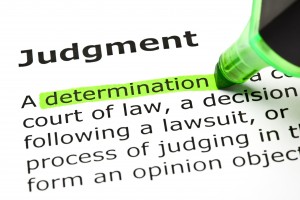By Ryan C. Wood
When filing for bankruptcy you may avoid a judicial or judgment lien from your house pursuant to 11 U.S.C. §522(f) if the bankruptcy filers interest in that property would be exempt but for the existence of the judgment or judicial lien. A motion must be filed with the court and given that the lien can be avoided or removed without the consent of the lien holder notice of the motion to the lien holder is extremely important.
A recent Ninth Circuit Bankruptcy Appellate Panel case discusses the service requirements for a motion to avoid a lien. See Frates v. Wells Fargo Bank, N.A.; BAP No. NC-13-1366-JuKiD Before discuss this case further there are ways to get rid of the judgment lien from your house outside of filing for bankruptcy protection. You could satisfy the judgment entered against you. The amount you will have to pay will include prejudgment interest, post-judgment interest, costs of enforcement of the judgment and attorney fees and costs. You might be able to negotiate a settlement, make the payments and then the judicial lien holder should remove the lien. A lump sum cash payment today is better than years of payments and uncertainty of when the lien holder will ever see a penny to collect on the judgment.
Back to the Frates case. In this case the Frates’ filed for bankruptcy protection under Chapter 13 of the Bankruptcy Code. They had a judgment lien recorded against their house and sought to avoid the lien pursuant to Section 522(f) by filing the appropriate motion with the court. Wells Fargo was the lien holder and never responded to the motion. So the Frates’ bankruptcy attorney sought enter of the order by default on the motion to avoid. The Bankruptcy Court denied the entry of the order by default on procedural grounds: (1) the notice of the motion failed to identify the real property and (2) the notice, motion and accompanying pleadings were not served on counsel listed on the abstract of judgment as required under Cal. Code Civ. P. (CCP) § 684.010. The Frates’ bankruptcy attorneys moved for reconsideration which the court denied. This appeal was then filed.
Notice of this motion is the issue in this case. Rule 9014(a), in turn, provides that relief shall be requested by motion and “reasonable notice and opportunity for hearing shall be afforded the party against whom relief is sought.” The Bankruptcy Court for the Northern District of California has a scream or die notice process that may be used for certain motions pursuant to LBR 9014. Notice and opportunity for a hearing is served on the opposing party and then it is incumbent on the opposing party to file a timely opposition or request for hearing. If opposition or a request for hearing is not timely filed the party that filed the motion may request entry of the order by default. “The standard for what amounts to constitutionally adequate notice, however, is fairly low; it’s ‘notice reasonably calculated, under all the circumstances, to apprise interested parties of the pendency of the action and afford them an opportunity to present their objection.’” Espinosa v. United Student Aid Funds, Inc., 553 F.3d 1193, 1202 (9th Cir. 2008) (citing Mullane, 339 U.S. at 314), aff’d, 559 U.S. 260 (2010).
Under these facts though Wells Fargo Bank, N.A. is an insured depository institution whereby service is governed by FRBP 7004(h). This rule provides service must be by certified mail addressed to an officer of the institution. In this case the debtors’ did serve Wells Fargo Bank, N.A. by certified mail and addressed the service to an officer of the institution. The other issue was whether California Civil Procedure Section 684.010 must be followed when serving a motion to avoid a lien. C.C.P. §684.010 governs judgment enforcement under California law and says notices and other papers are required to be served on the judgment creditor’s attorney of record rather than on the judgment creditor if the judgment creditor has an attorney of record. In Frates the 9th Circuit Bankruptcy Appellate Panel held that nowhere do the bankruptcy rules require compliance with C.C.P. §684.010 in lien avoidance actions and applying C.C.P. §684.010 creates confusion about where and when bankruptcy practitioners should follow state law even when they comply with applicable bankruptcy rules.
